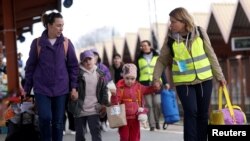A report by UNHCR, the U.N. refugee agency, says Ukrainian refugees in Europe are eager to work but need help to do so.
The report, "Lives on Hold: Intentions and Perspectives of Refugees from Ukraine," is based on responses gathered in August and September from 4,800 Ukrainians across Europe.
Most said they wanted to go home. Until that becomes possible, they said they wanted to work to support themselves and their families and to contribute to the societies hosting them.

UNHCR spokesman Matt Saltmarsh said some 70% of the refugees surveyed have higher education qualifications and two-thirds were working in Ukraine before they fled the country.
“These refugees are eager to reenter the labor market, which would lessen their reliance on national welfare systems, but currently, less than one-third are employed or self-employed," he said. "Refugees are seeking to play a more active role in their host countries, but they need additional support. New needs have emerged as displacement has continued.”
The latest UNHCR figures show more than 7.4 million Ukrainians have fled to countries across Europe. Most are women and children. Another 6.9 million are displaced inside Ukraine.
Saltmarsh said many refugees indicated they would have a better chance of getting work if classes to learn local languages were available and their skills were recognized. They mentioned help with child care services would enable them to work outside the home.
“Without work, many are struggling to make ends meet and find adequate housing solutions," he said. "Nearly half are staying with hosts, 20% are living in collective sites or hotels, while a quarter are renting. Many are deeply concerned about finding alternative sustainable solutions ahead of the winter.”
Saltmarsh said other pressing needs include psychological support and specialized help for children and older people with disabilities. He added nearly a third of respondents reported at least one family member had a disability.


